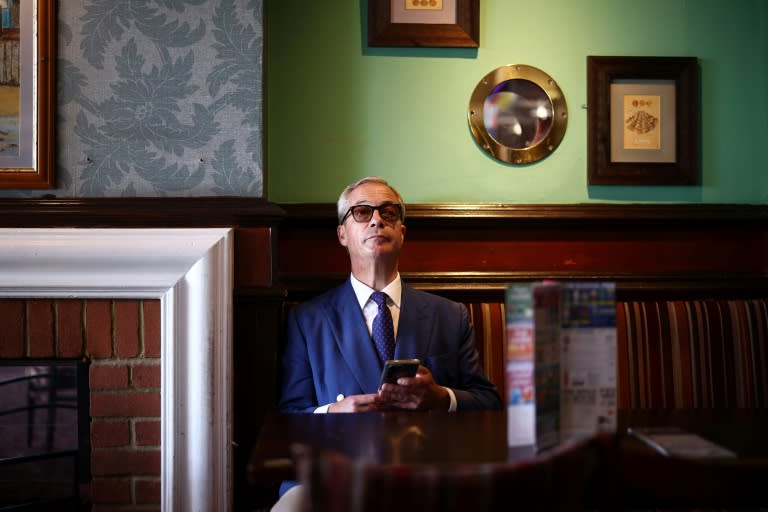UK's Farage hails establishment 'revolt' after election gains

Brexit figurehead Nigel Farage claimed to have kickstarted a "revolt against the establishment", as his hard-right party made significant gains in UK election results announced early Friday.
Reform UK, a re-brand of the Brexit Party that Farage founded in 2018, had won four seats after around four-fifths of the UK's 650 constituencies had declared their results.
They include Clacton, eastern England, where Farage prevailed in his eighth attempt to become an MP, beating the Conservative incumbent by a wide margin.
Meanwhile, his party appeared on course to win an unprecedented vote share for a party on Britain's far-right fringes.
"This is just the first step of something that is going to stun all of you," Farage said from the podium of Clacton's polling station, shortly after his win was announced.
"The revolt against the establishment is underway," he had earlier posted on X.
An initial exit poll had caused a stir Thursday night after predicting Reform would secure 13 seats -- far exceeding forecasts in the latter stages of the campaign that it would win just a handful of seats.
A far-right party has never won more than a single seat in a UK general election.
Farage's win will likely embolden the attention-grabbing populist figurehead in his long-term aim of staging a "takeover" of the Conservatives.
Millions of their voters appeared to have already switched their support to Reform, leaving the Tories -- in power since 2010 -- facing one of their worst-ever results.
"There is a massive gap on the centre-right of British politics and my job is to fill it, and that's exactly what I'm going to do," Farage added in his victory speech.
- 'Chaotic' -
Reform's surge comes as hard-right parties or politicians increase their appeal across Europe and in the United States.
Seen as one of Britain's most effective communicators and campaigners, Farage -- a privately educated son of a stockbroker -- is a long-time ally of US President Donald Trump.
The 60-year-old is a one-time Conservative who quit the party in the early 1990s to co-found the Eurosceptic UK Independence Party (UKIP).
He pulled off an unprecedented win in the 2014 European Parliament elections, serving as an MEP for the fringe party for around two decades and helping to make Euroscepticism more mainstream.
But UKIP never managed to win more than one seat in a general election. Farage himself failed to become an MP on seven separate occasions.
But his national prominence continued to grow after he became a driving force behind the 2016 Brexit vote, before forging a career as a presenter on the brash right-wing TV channel GB News.
Entering the 2024 general election after initially ruling himself out, Farage said he was bidding to emulate efforts in Canada in the 1990s by right-wing fringes to take over its Conservative Party.
His candidacy dramatically re-energised Reform UK, while spooking the Tories as polls immediately registered an uptick in support for the hard-right anti-immigrant outfit.
Conservatives and centrists now fear Farage could have the perfect platform in parliament to further legitimise his staunchly anti-establishment populist messaging.
But Tony Travers, from the London School of Economics, noted Farage has had multiple stints leading several re-branded hard-right parties over recent decades, with limited success.
"It's rather chaotic in many ways," he said of its latest Reform UK iteration.
"And I think that's going to make it very hard... to build it to anything like the scale of the equivalent parties in France or indeed Trump's Republicans."
jj/pdh/tym

 Yahoo News
Yahoo News 
